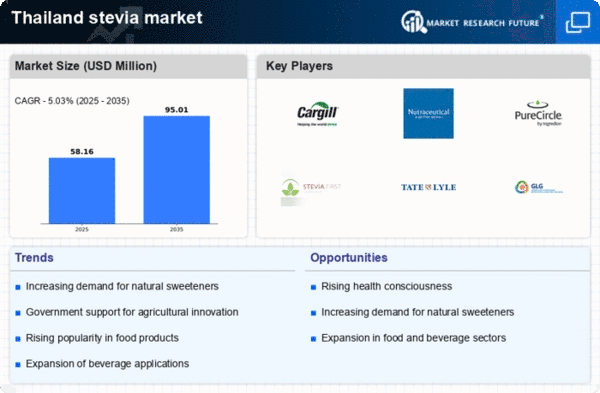Supportive Government Policies
Government initiatives aimed at promoting healthier food choices are significantly impacting the stevia market in Thailand. The Thai government has implemented various policies to encourage the use of natural sweeteners, including stevia, in food production. These policies are designed to reduce sugar consumption and combat health issues related to high sugar intake. As a result, the stevia market is experiencing increased visibility and acceptance among consumers and manufacturers alike. Furthermore, financial incentives for farmers cultivating stevia plants may enhance local production capabilities, thereby stabilizing supply and potentially lowering prices. This supportive regulatory environment is likely to foster innovation and investment in the stevia market, making it an attractive sector for both domestic and international stakeholders.
Expansion of Distribution Channels
The expansion of distribution channels is a crucial driver for the stevia market in Thailand. As consumer awareness of stevia increases, the need for accessible products becomes paramount. Retailers, both online and offline, are beginning to stock a wider variety of stevia-based products, making them more readily available to consumers. This trend is supported by the rise of e-commerce platforms, which facilitate the distribution of health-oriented products. Additionally, partnerships between stevia producers and food manufacturers are likely to enhance product availability in mainstream grocery stores. The growing presence of stevia in various retail formats is expected to contribute to an increase in sales, thereby propelling the stevia market forward. As distribution channels continue to expand, consumer access to stevia products will likely improve, further driving market growth.
Growing Demand for Natural Sweeteners
The increasing consumer preference for natural sweeteners is a pivotal driver in the stevia market. As health-conscious individuals seek alternatives to sugar, the demand for stevia, a plant-derived sweetener, has surged. In Thailand, the market for natural sweeteners is projected to grow at a CAGR of approximately 8% over the next five years. This shift towards healthier options is influencing food and beverage manufacturers to incorporate stevia into their products, thereby expanding the stevia market. The trend is further supported by the rising incidences of diabetes and obesity, prompting consumers to opt for low-calorie sweetening solutions. Consequently, the stevia market is likely to witness robust growth as more companies respond to this demand by developing innovative products that utilize stevia as a key ingredient.
Rising Popularity of Functional Foods
The trend towards functional foods, which offer health benefits beyond basic nutrition, is driving growth in the stevia market. In Thailand, consumers are increasingly seeking products that not only satisfy their taste preferences but also contribute to their overall well-being. Stevia, known for its zero-calorie content and natural origin, aligns perfectly with this trend. The market for functional foods is expected to expand significantly, with projections indicating a growth rate of around 10% annually. This rising popularity is prompting food manufacturers to explore innovative formulations that incorporate stevia, thereby enhancing the appeal of their products. As a result, the stevia market is likely to benefit from this shift, as more consumers gravitate towards healthier, functional options that utilize stevia as a primary sweetening agent.
Increased Investment in Research and Development
Investment in research and development (R&D) within the stevia market is becoming increasingly vital. Companies in Thailand are recognizing the potential of stevia and are allocating resources to explore new extraction methods and product applications. This focus on R&D is expected to lead to the development of high-purity stevia extracts, which can enhance flavor profiles and improve consumer acceptance. Moreover, advancements in agricultural practices may result in higher yields and better quality of stevia crops. As the market evolves, these innovations could provide a competitive edge to companies operating in the stevia market, allowing them to meet the growing demand for natural sweeteners more effectively. The emphasis on R&D is likely to drive the market forward, fostering a culture of innovation and sustainability.
















